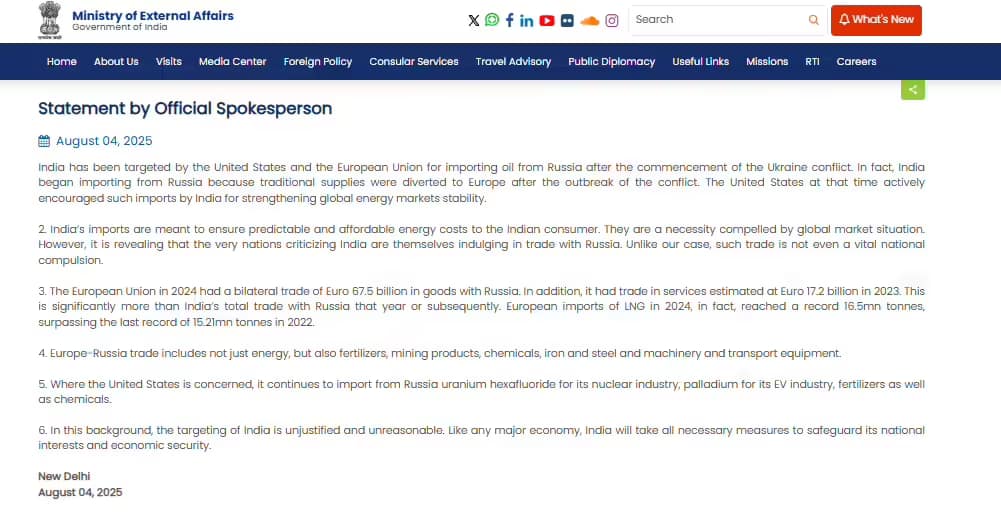In a world already strained by complex geopolitics, a new spark has lit the fire of international debate. Former U.S. President Donald Trump recently declared that if he returns to office, the United States would consider hiking tariffs on countries like India that continue to buy oil from Russia. The statement, widely shared across global media, has not gone unnoticed. In fact, India has responded with calm firmness—labeling such targeting as “unjustified and unreasonable.”

India Defends Its Right to Energy Security
The Ministry of External Affairs (MEA) stood tall and clear in its response. India, like every sovereign nation, has the right to make energy decisions based on its national interests and economic needs. Amid rising inflation, global instability, and volatile oil prices, the MEA emphasized that India’s engagement with Russia for energy trade is a practical, balanced, and transparent decision.
The Indian government made it known that buying oil from Russia is not a political statement but a strategic necessity. India imports more than 80% of its crude oil requirements, and affordable energy is crucial for its 1.4 billion citizens. To single out India, while many other countries maintain trade ties with Russia in various sectors, is not only unfair—it sets a dangerous precedent, the MEA suggested.
Trump’s Warning Creates Global Ripples
Trump’s comments have created waves across both diplomatic and economic circles. While addressing a campaign rally, he stated that nations purchasing oil from Russia would face increased tariffs if they expect to continue trading with the U.S. This implied pressure on India and others came without considering the nuances of regional energy security or the global economic divide.
The former president’s rhetoric might appeal to sections of his domestic base, but for many in the international community, such aggressive tones risk undermining long-standing partnerships. India, which has maintained a neutral stance in the Russia-Ukraine conflict while consistently calling for peace and diplomacy, finds itself once again at the center of great-power politics it did not ask to be part of.
India’s Global Role Isn’t Defined by Threats
The Indian response was not emotional or reactive—it was measured and dignified. New Delhi has long stood for strategic autonomy, making its own choices based on what serves its people and global responsibilities best. Over the years, India has worked hard to build strong ties with both Washington and Moscow, and it has consistently acted in favor of peace, development, and global balance.
Attempts to pressure or punish India for choosing energy sources that make economic sense disregard the challenges developing nations face. Instead of isolating or threatening such countries, many experts believe global cooperation on energy affordability and transition is the more humane and effective path forward.
Looking Ahead: India Seeks Respect, Not Restraint
As the world watches the build-up to the 2024 U.S. election, it’s clear that campaign statements—especially those involving foreign policy—can carry real consequences. But India’s message remains steady: mutual respect must be the foundation of any serious bilateral relationship.
India is not a passive player—it is a rising global voice, a crucial economic power, and a committed partner in peace. And while it will always be open to dialogue, it will not be swayed by fear or unfair pressure. In times like these, diplomacy, not division, must lead the way.
Disclaimer: This article is based on current news reports and official statements as of August 2025. The views and interpretations expressed here aim to reflect public discourse and official positions without promoting any political ideology. Statements attributed to public figures are quoted from publicly available sources and may be subject to updates or clarification.
Discover more from News Diaries
Subscribe to get the latest posts sent to your email.
1 thought on “‘Unjustified and Unreasonable’ Says MEA After Trump’s Threat Over Russian Oil Trade”